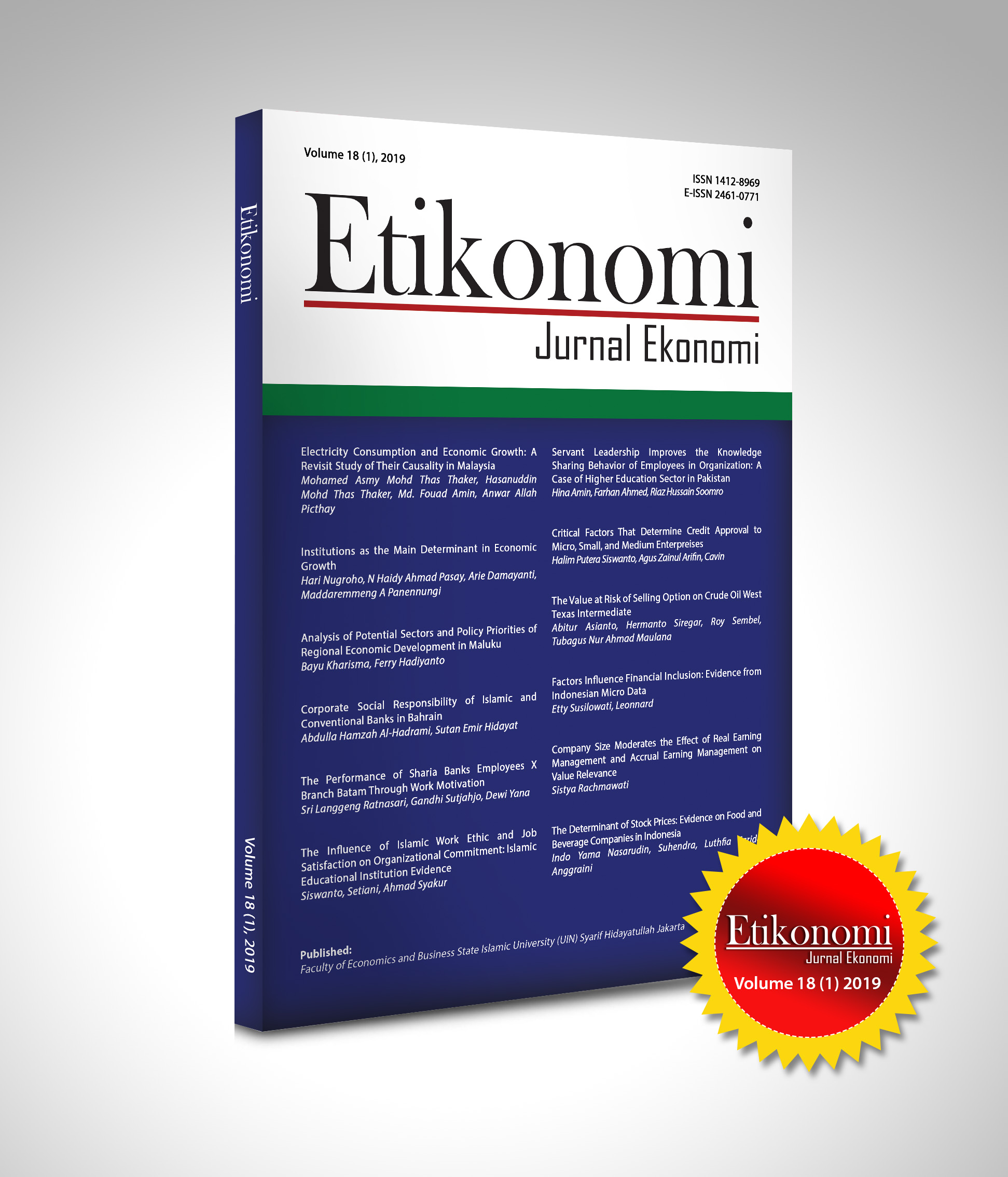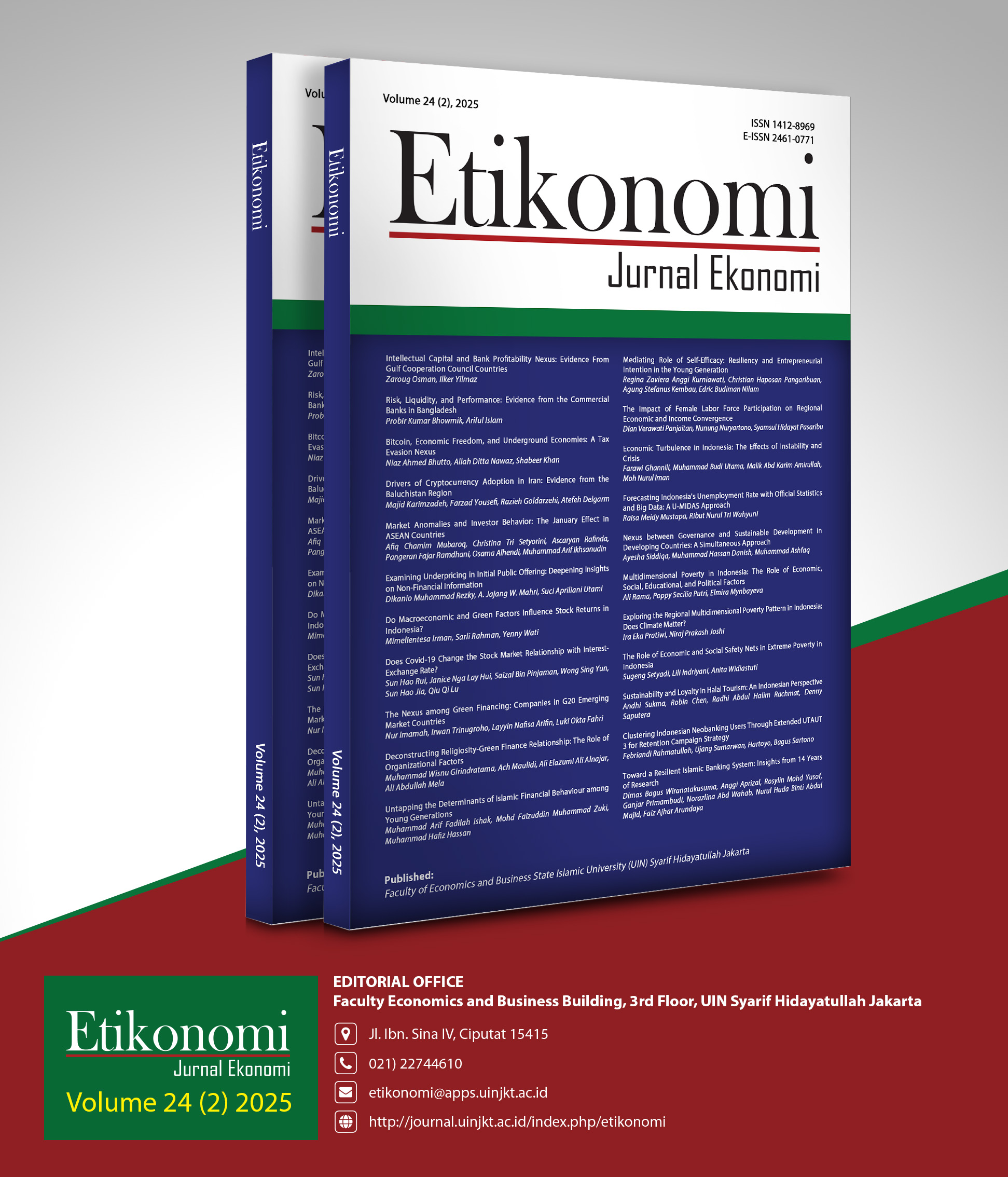Company Size Moderates the Effect of Real Earning Management and Accrual Earning Management on Value Relevance
DOI:
https://doi.org/10.15408/etk.v18i1.9381Keywords:
earnings management, value relevance, company sizeAbstract
The purpose of this study is to determine the effect of real and accrual earnings management on the value relevance, proxied by predictive value, feedback value and timeliness. Furthermore, this study investigates whether the company size variable can strengthen the effect of real and accrual earning management on value relevance. Multiple regression models are used with secondary data between 2014-2016 from 61 companies, resulting in 183 observations. The results show that there are positive effects of accrual earnings management on predictive value and feedback value and adverse effect on timeliness. Meanwhile, real earnings management only has a positive effect on predictive value. On the other hand, company size only strengthens the effect of accrual earnings management on timeliness.
JEL Classification: G39, M41
Downloads
References
Ahmadpour, A., & Hadiyan, S. A. (2015). Change in The Value Relevance of Accounting Information and Identifying the Factors Affecting the Value Relevance. The Iranian
Accounting and Auditing Review, 22(1), 1–20.
Altintas, A. T., Sari, E. S., & Otluoglu, E. (2017). The Impact of Earnings Management on The Value Relevance of Earnings: Empirical Evidence From Turkey. The Journal of
International Social Research, 10(51), 885–891.
Ball, R., & Brown, P. (1968). An Empirical Evaluation of Accounting Income Numbers. Journal of Accounting Research, 6(2), 159–178.
Ball, R., & Shivakumar, L. (2006). The Role of Accruals in Asymmetrically Timely Gain and Loss Recognition. Journal of Accounting Research, 44(2), 207–242.
Bayat, M., Zalaghi, H., & Mirhosseini, I. (2015). A Survey of The Influence of Earning Sustainability on Value Relevance of Accounting Information. The Iranian Accounting and Auditing Review, 22(1), 41–58.
Christensen, T. E., Hoyt, R. E., & Paterson, J. S. (1999). Ex Ante Incentives for Earnings Management and the Informativeness of Earnings. Journal of Business Finance and
Accounting, 26(7–8), 807–832.
Gill, A., & Obradovich, J. D. (2013). The Impact of Corporate Governance and Financial Leverage on the Value of American Firms. International Research Journal of Finance and
Economics, 9(91), 1–14.
Godfrey, J. M., Hodgson, A., Tarca, A., Hamilton, J., & Holmes, S. (2010). Accounting Theory, 7th edition. Australia: Jhon Willey & Sons.
Gul, F. A., Fung, S. Y. K., & Jaggi, B. (2009). Earnings Quality: Some Evidence on the Role of Auditor Tenure and Auditors’ Industry Expertise. Journal of Accounting and
Economics, 47(3), 265–287.
Habib, A. (2004). Impact of Earnings Management on Value-Relevance of Accounting Information: Empirical Evidence From Japan. Managerial Finance, 30(11), 1–15.
Harahap, S. S. (2012). Teori Akuntansi, Edisi Revisi (Accounting Theory, Revised Edition). Jakarta: PT. Raja Grafindo Persada.
Hermuningsih, S. (2011). Pengantar Pasar Modal Indonesia (Introduction to Indonesian Capital Market). Yogyakarta: UPP STIM YKPN.
Holthausen, R. W., & Watts, R. L. (2001). The Relevance of the Value-Relevance Literature for Financial Accounting Standard Setting. Journal of Accounting and Economics, 31(1–3), 3–75.
Ikatan Akuntan Indonesia. (2017). Pernyataan Standar Akuntansi Keuangan (Statement of Financial Accounting Standards). Jakarta: Ikatan Akuntan Indonesia.
Kothari, S. P. (2001). Capital Markets Research in Accounting. Journal of Accounting and Economics, 31, 105–231.
Krismiaji, Aryani, Y. A., & Suhardjanto, D. (2013). Pengaruh Adopsi International Financial Reporting Standard Terhadap Kualitas Informasi Akuntansi (The Effect of Adopting
International Financial Reporting Standard to the Quality of Accounting Information). Jurnal Akuntansi Dan Manajemen, Fakultas Ekonomi Universitas Negeri Surabaya, 24(2), 63–71.
Marquardt, C. A., & Wiedman, C. I. (2004). The Effect of Earnings Management on the Value Relevance of Accounting Information. Journal of Business Finance and Accounting,
(3–4), 297–332.
Mostafa, W. (2017). The Impact of Earnings Management on The Value Relevance of Earnings: Empirical Evidence From Egypt. Managerial Auditing Journal, 32(1), 50–74.
Munawir. (2010). Analisis Laporan keuangan (Financial Statement Analysis). Yogyakarta: Liberty
Murwaningsari, E., Utama, S., & Rossieta, H. (2015). The Combined Effects of Financial Derivatives and Discretionary Accruals on the Value Relevance of Earnings and the Book Value of Equity. Gajah Mada International Journal of Business, 17(2), 179–198.
Oraby, S. A. (2017). The impact of Earnings Management Strategies on Accounting Information Relevance. International Journal of Business and Social Science, 8(4), 125–135.
Owusu-Ansah, S. (2000). Timeliness of Corporate Financial Reporting in Emerging Capital Markets: Empirical Evidence from the Zimbabwe Stock Exchange. Accounting and Business Research, 30(3), 241–254.
Prasetyorini, B. F. (2013). Pengaruh Ukuran Perusahaan, Leverage, Price Earning Ratio Dan Profitabilitas Terhadap Nilai Perusahaan (The Effect of Firm Size, Leverage, Price Earning Ratio, and Profitability to Firm Value). Jurnal Ilmu Manajemen, 1(1), 183–196.
Rachmawati, S. (2010). Asimetri Informasi Memoderasi Beban Pajak Tangguhan dan Manajemen Laba (Asymmetric Information Moderates Deferred Tax and Earnings Management). Jurnal Informasi, Perpajakan, Akuntansi Dan Keuangan Publik, 5(1), 41-55.
Roychowdhury, S. (2006). Earnings Management Through Real Activities Manipulation. Journal of Accounting and Economics, 42(3), 335–370.
Scott, W. R. (2009). Financial Accounting Theory, 5th ed. New Jersey: Prentice-Hall.
Shan, Y. G. (2015). Value Relevance, Earnings Management and Corporate Governance in China. Emerging Markets Review, 23, 186–207.
Subramanyam, K. R. (1996). The Pricing of Discretionary Earning Management Accruals. Journal of Accounting and Economics, 22, 249-281
Subramanyam, K., & John, J. (2010). Analisis Laporan Keuangan, Buku satu, Edisi sepuluh [Financial Statement Analysis, Book One, Tenth Edition, Trans]. Jakarta: Salemba Empat.
Suhartati, T., Warsini, S., & Sixpria, N. (2011). Pengaruh Pengungkapan Tanggung Jawab Sosial dan Praktik Tata Kelola Perusahaan terhadap Nilai Perusahaan (The Effect of Disclosure of Corporate Social Responsibility and Corporate Governance Practices to Firm Value).Jurnal Ekonomi Dan Bisnis, 10(2), 95–105.
Sulistiawan, D. (2011). Creative Accounting. Jakarta: Salemba Empat.
Suwardjono. (2010). Teori Akuntansi Perekayasaan Pelaporan Keuangan, Edisi Ketiga (Accounting Theory for Financial Statement Manipulation, Third Edition). Yogyakarta: BPFE.
Toding, M., & Wirakusuma, M. G. (2013). Faktor-Faktor Yang Mempengaruhi Ketepatwaktuan Penyampaian Laporan Kuangan (Factors Affecting the Timeliness of Financial Statement Disclosure). E- Journal Akuntansi Universitas Udayana, 3(2), 318–333.
Tucker, J. W., & Zarowin, P. A. (2006). Does Income Smoothing Improve Earnings Informativeness? The Accounting Review, 81(1), 251–270.
Whelan, C., & McNamara, R. (2004). The Impact of Earnings Management on the Value-Relevance of Financial Statement Information. SSRN. https://doi.org/10.2139/ssrn.585704
Yokoyama, K. Y., Baioco, V. G., Sobrinho, W. B. R., & Neto, A. S. (2015). The Influence of Company Size on Accounting Information: Evidence in Large Caps and Small Caps Companies Listed on BM & FBovespa. Journal of Education and Research in Accounting, 9(3), 302–319.
Zarowin, P. (2002). Does Income Smoothing Make Stock Prices More Informative? New York University Working Paper No. 2451/27592.














